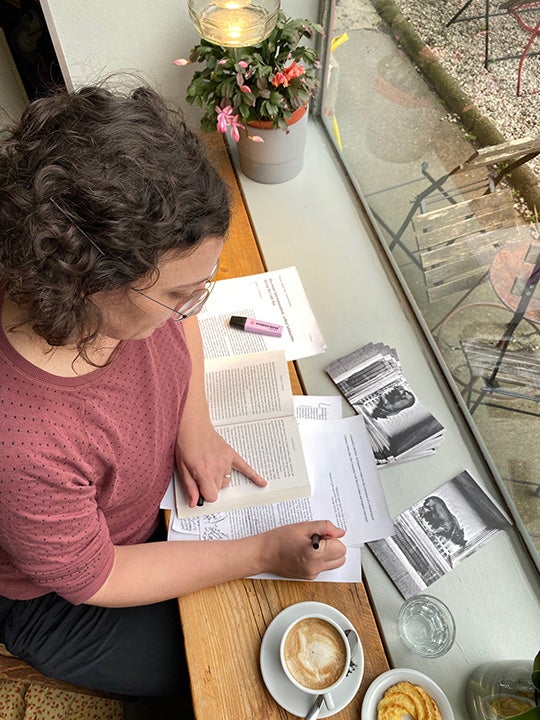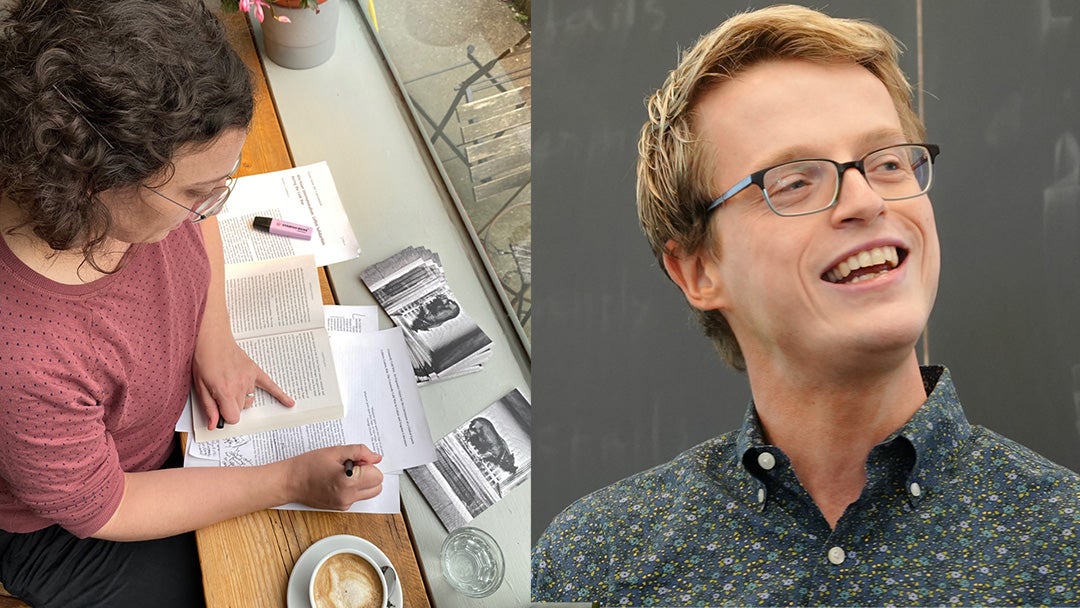Speaking to his new colleagues at Rice University’s School of Humanities and the Humanities Research Center (HRC), Thimo Heisenberg’s energy and passion spilled out. The assistant professor, who joined the Department of Philosophy in the fall of 2023, had been invited to share about his research into early 19th century German philosophers.
“The reason why I’m interested in this particular period is because these thinkers in early 19th century Germany — so-called German idealists — approached economic justice in a way that brings together elements that we today think are incompatible,” Heisenberg said.

Johann Gottlieb Fichte, Heisenberg offered as an example, argued for a planned economy based on the value of individual liberty, while Georg Wilhelm Friedrich Hegel argued that the market economy is good because it fosters social solidarity.
“I’m really interested in figuring out whether these kinds of positions can in fact be made workable, so that they help us bridge divides between socialism and libertarianism today,” Heisenberg said.
He plans to compile his research into a book, which would be the first to present the political economy of German idealism in its entirety. Until now, Heisenberg said, books have addressed the philosophers and their economic commentary separately.
“There’s really no systematic study yet that’s trying to put all of these kinds of strands together to evaluate them for their contemporary philosophical significance,” Heisenberg said.
He recently received a prestigious Humboldt Research Fellowship from the Alexander von Humboldt Foundation, which will help in his research. Meanwhile, Sophie Esch, an associate professor of Latin American literature and culture and director of the Center for Latin American and Latinx Studies, is currently working on the third leg of her Humboldt Research Fellowship.
“The recognition of Thimo Heisenberg and Sophie Esch by the Alexander von Humboldt Foundation is a testament to their scholarly excellence and the global impact of their work,” said Ramamoorthy Ramesh, Rice’s executive vice president for research.
Founded in 1953 by the Federal Republic of Germany, the Humboldt Foundation fosters academic collaboration between German universities and outstanding global scientists and scholars. Recipients of its fellowships conduct research projects alongside German hosts and partners, joining a community of more than 30,000 researchers across 140 countries.
Heisenberg will be hosted by Humboldt University in Berlin during his fellowship.
“The important part is that it brings me into contact with some great interlocutors in Germany, who are going to be important people to talk to for the kind of topics that I’m developing,” Heisenberg said. “It has both great historians of 19th century German philosophy and great philosophers working on contemporary issues regarding economic justice. Since my project brings exactly those two areas of research together and in dialogue with one another, Humboldt University seemed to be a great place to work on this book.”

Esch is currently working in Berlin. She has had two academic hosts in Germany: the Ibero-American Institute (Prussian Cultural Heritage Foundation) in Berlin, a key institution for academic and cultural exchange between Europe and Latin America, and the Department of Romance Studies at the University of Cologne while she researches what will be her second book.
Reconnecting with German academia via the Humboldt fellowship has been a welcome experience, said Esch, who completed her undergraduate degree in Germany, then came to the United States for her Ph.D.
“That I have an Alexander von Humboldt Fellowship to do research for my current book is meaningful for me, because Alexander von Humboldt is particularly famous for all the environmental research that he did in Latin America,” Esch said. “It feels fitting for the research I am currently pursuing.”
Her in-progress book on multispecies narratives of war and revolution in Latin America and Africa delves into a distinct aspect of global Cold War literature, exploring narratives that intricately weave nonhuman creatures and ecological complexities into their stories and offer a counternarrative to the simplistic bipolar perspectives of the era. Esch says the idea for the topic came to her after reading Mia Couto’s novel “Sleepwalking Land,” which is set in 1980s war-torn Mozambique.
“I was really struck by it because I thought it was doing something very different in terms of telling a war story,” Esch said. “We’re used to humans appearing in war stories, but nonhuman entities appear in ‘Sleepwalking Land’: goats, baobab trees, chickens. The overall idea is that the land is sentient and is itself suffering from the war and is in upheaval.”
In her research, Esch is seeking out narratives of war that explain in a more holistic way how war impacts multiple entities, not just humans.
Two senior scholars external to Rice and several Rice faculty reviewed Esch’s work in a March manuscript workshop financed by the HRC, the feedback from which Esch is now incorporating into the book during her Humboldt stay. The workshop featured an international and interdisciplinary cohort of scholars working in the U.S., scholars who originally hail from Canada, Nigeria, Ghana, Colombia, French Guyana and Germany.
“I consider myself very fortunate to have this stellar international group of scholars read my manuscript and give me feedback,” Esch said. “It changed my perspective on the book’s argument and scope, and I am thrilled about the time I have in Germany to work on parts of the book. I just want to make sure it’s the best version possible when it comes out.”
That’s right in line with the goals of the Humboldt Foundation, one of which is to establish a worldwide network of excellence. This network, which includes 61 Nobel Prize winners, offers extensive opportunities for ongoing research and collaboration.
“When you think about the building of this kind of network, it really doesn’t matter so much what people’s passports say,” said Heisenberg. “It matters where they are and how you can build this network as broadly as possible.”
Like Esch, Heisenberg is from Germany and earned his Ph.D. in the U.S., more a testament to the caliber of Rice’s faculty than a charming coincidence.
“We are proud to support their endeavors and look forward to the insights they will continue to offer to their respective fields and beyond,” Ramesh said.

